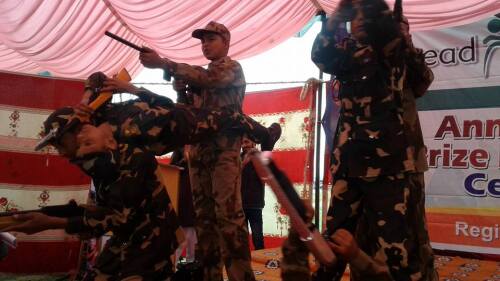On November 13, on Capitol Hill, the Middle East Forum, in conjunction with the South Asian Minorities Alliance Foundation, the Investigative Project on Terrorism, and Liberty South Asia, hosted a discussion on the threats posed by Jamaat-e-Islami (JI), a South Asian Islamist organization tied to terror in India, Pakistan and Bangladesh, as well as extremism and radicalization in Europe and North America.
Addressing the event, Congressman Jim Banks (R-Indiana) said that much of the current violence in the Kashmir region is linked to JI’s activities in the region. “Nevertheless,” he added, “their actions have gone largely unnoticed on the world stage. This lack of knowledge and awareness of such a dangerous group is extremely concerning.”
“Domestically, the Islamic Circle of North America, also known as ICNA, is a thinly veiled front group within the United States that acts as a community organization. ... ICNA wields considerable power over many Islamic communities, imposing its ideology on American Muslims through the guises of charity, community work and political activism.”
South Asia expert Seth Oldmixon highlighted the role of JI in promoting and exporting religious extremism and terrorism on a global scale, noted the enduring legacy of JI’s founder Abul Ala Mawdudi, and warned of the dangers of ignoring the activities of JI and its affiliates in North America.
“Jamaat-e-Islami’s guiding ideology and its goal of establishing a global theocracy have not changed from Mawdudi’s original vision,” Oldmixon said. He noted the continued calls for jihad expressed by senior Jamaati leaders, and the continued violence perpetrated by JI and its affiliates.
Its commitment to terror is also apparent in its public rhetoric, Oldmixon contended, noting that in 2012, a senior Pakistani JI official praised Osama Bin Laden and said: “I salute the Afghan Taliban. They have defeated America and have destroyed NATO.”
South Asia Minority Alliance Chairman (SAMAC) Nadeem Nusrat described the striking similarities between the ideologies of Egypt’s Muslim Brotherhood and JI. Nusrat, who also heads Washington DC-based Voice of Karachi, elaborated on the ideology, workings, and reach of JI. He said that no other religious group has done more to radicalize Pakistan religiously than JI.
Abha Shankar, of the Investigative Project on Terrorism, presented the findings of her organization’s comprehensive research into ICNA. Shankar revealed that ties between ICNA and senior JI officials in South Asia were much closer than previously known.
“Jamaat-e-Islami believes in Islamic revolution, with the ultimate goal of establishing a global Islamic superstate, ruled by sharia,” Shankar explained. “This is exactly what is preached by ICNA at its conventions, at its events and in its publications.”
“ICNA’s radical leadership not only includes ties to Jamaat-e-Islami, but it has also glorified jihad and martyrdom, and speaks in support of Islamist movements.” In its publication, Message International, ICNA officials “support jihad in Kashmir and Palestine” and “defend terrorists and other radicals.”
Sam Westrop, director of the Middle East Forum’s Islamist Watch project, highlighted the methods employed by JI affiliates in Europe in imposing its leadership on European Muslim communities, and radicalizing a generation of Muslim youth. He noted that this led to a significant number of recruits to terrorist organizations from Muslim communities largely controlled by JI organizations.
The damage done by JI in Europe, he warned, is a harbinger for future extremism in the United States. The “most obvious” indication of this, he noted, is the growing issue of South Asian terror finance. “In 2017, Helping Hand for Relief and Development, a partner organization of ICNA, openly partnered with Lashkar-e-Taiba, which was responsible for the 2008 Mumbai attacks, in which dozens were murdered.”
“Jamaat is tied into terror finance. It is part of its infrastructure. We must stop legitimizing Jamaat as the face of American Islam, and stop handing over taxpayer dollars to its so-called charitable affiliates.”
Representative Banks agreed with the panelists’ remarks, concluding: “We cannot ignore these trends any longer. We must discuss these ties and prevent the spread of this threat before it starts overreaching on American shores.”
“That’s why I introduced H.Res.160 earlier this year. This resolution calls on USAID and the US State Department to refrain from any partnerships or funding arrangements from any organization affiliated with radical Islamic groups.”







